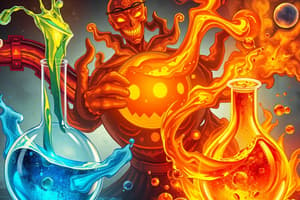Podcast
Questions and Answers
What is the product of the thermal decomposition of lead nitrate?
What is the product of the thermal decomposition of lead nitrate?
- Nitrogen dioxide and water
- Lead oxide, nitrogen dioxide, and oxygen (correct)
- Lead nitrate and nitrogen dioxide
- Lead oxide and oxygen
What is the color of the fumes emitted during the heating of lead nitrate?
What is the color of the fumes emitted during the heating of lead nitrate?
- White
- Brown (correct)
- Yellow
- Colorless
What is the purpose of adding dilute sulphuric acid to the water in Activity 1.7?
What is the purpose of adding dilute sulphuric acid to the water in Activity 1.7?
- To decrease the pH of the water
- To remove impurities from the water
- To increase the temperature of the water
- To facilitate the electrolysis of water (correct)
What is the voltage of the battery used in Activity 1.7?
What is the voltage of the battery used in Activity 1.7?
What is the purpose of inverting the test tubes over the carbon electrodes in Activity 1.7?
What is the purpose of inverting the test tubes over the carbon electrodes in Activity 1.7?
What is the result of bringing a burning candle close to the mouth of the test tube containing oxygen?
What is the result of bringing a burning candle close to the mouth of the test tube containing oxygen?
What is the reaction that occurs when lead nitrate is heated?
What is the reaction that occurs when lead nitrate is heated?
What is the purpose of using carbon electrodes in Activity 1.7?
What is the purpose of using carbon electrodes in Activity 1.7?
What is the gas produced at the anode during the electrolysis of water in Activity 1.7?
What is the gas produced at the anode during the electrolysis of water in Activity 1.7?
What is the result of the thermal decomposition of lead nitrate?
What is the result of the thermal decomposition of lead nitrate?
Flashcards are hidden until you start studying
Study Notes
Decomposition Reaction
- A decomposition reaction is a type of reaction where a single reactant breaks down to give simpler products.
- Example: Heat decomposes ferrous sulphate (FeSO4) to ferric oxide (Fe2O3), sulphur dioxide (SO2), and sulphur trioxide (SO3).
Thermal Decomposition
- Thermal decomposition is a decomposition reaction that occurs when a substance is heated.
- Example: Heat decomposes calcium carbonate (CaCO3) to calcium oxide (CaO) and carbon dioxide (CO2).
Examples of Decomposition Reactions
- Ferrous sulphate (FeSO4) decomposes to ferric oxide (Fe2O3), sulphur dioxide (SO2), and sulphur trioxide (SO3) when heated.
- Calcium carbonate (CaCO3) decomposes to calcium oxide (CaO) and carbon dioxide (CO2) when heated.
- Lead nitrate (Pb(NO3)2) decomposes to lead oxide (PbO), nitrogen dioxide (NO2), and oxygen (O2) when heated.
- Vegetable matter decomposes to compost, an example of an exothermic reaction.
Importance of Decomposition Reactions
- Decomposition reactions are used in various industries, such as the manufacture of cement.
- Decomposition reactions occur in nature, such as the breakdown of carbohydrates in the body to provide energy through respiration.
Electrolysis of Water
- Electrolysis of water is a decomposition reaction that occurs when an electric current is passed through water.
- Water decomposes into hydrogen and oxygen gases when an electric current is passed through it.
Studying That Suits You
Use AI to generate personalized quizzes and flashcards to suit your learning preferences.




